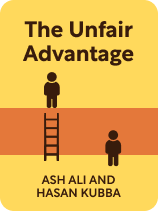

This article is an excerpt from the Shortform book guide to "The Unfair Advantage" by Ash Ali and Hasan Kubba. Shortform has the world's best summaries and analyses of books you should be reading.
Like this article? Sign up for a free trial here .
How much can you invest in your startup? How much of a financial leg up can you give your new business?
If you have sizable assets to invest in your startup, you have a leg up over the competition. Valuable assets are one of the unfair advantages identified in the book The Unfair Advantage by entrepreneurs Ash Ali and Hasan Kubba. The authors discuss a potential drawback of assets, how to know if your assets are your unfair advantage in particular, and how to improve and make the most of your assets.
Keep reading to learn about the unfair advantage of startup assets.
Unfair Advantage #1: Valuable Assets
According to Ali and Kubba, valuable assets include money and anything that you can exchange for money, such as property, investments, or jewelry. If you have enough money to finance the initial launch of your startup and the first several months of operations—without having to struggle to pay for housing, food, and other life essentials—it’s a huge unfair advantage. Also, having sufficient money can give you peace of mind that you won’t be destitute if things don’t go exactly as planned, which can empower you to take more aggressive actions that hopefully translate into growth.
A Potential Drawback of Valuable Assets
However, having a valuable stockpile to use for startup assets doesn’t guarantee success. As Ali and Kubba point out, many wealthy startup founders have failed spectacularly despite their privilege. Why does this happen? One reason is that excessive wealth sometimes makes people lazy and entitled, and thus less willing to do the hard work needed to succeed.
(Shortform note: As we mentioned previously, research supports Ali and Kubba’s assertion that entrepreneurs with access to money have a significant advantage. Research also suggests wealthy entrepreneurs think differently, which further boosts their success. They have an “abundance mentality,” which is characterized by the belief that resources are plentiful and there’s enough out there for everyone. This gives them a deep sense of security that emboldens them to think big and have an optimistic outlook. Thus, money has the potential to positively affect people’s external circumstances and their mindsets. So, while money can make people feel entitled, discouraging them from exerting the effort required to succeed, on balance, it’s a major advantage.)
How to Know If Valuable Assets Are Your Unfair Advantage
How do you know if valuable assets are an unfair advantage for you? Ali and Kubba recommend that you consider this question: Do you have (or can you get) enough money to fund at least six months of operations? If you answer yes, this is one of your unfair advantages.
(Shortform note: To determine how much money you’ll need to fund your first six months, as Ali and Kubba suggest, take time to calculate your startup costs. You’ll incur different expenses depending on your business type—for example, online or brick-and-mortar. Typical expenses include permits, licenses, advertising, office space, equipment, utilities, insurance, and website construction. Consider reaching out to other business owners to see what they pay for expenses so you include all probable costs in your estimates.)
How to Improve and Make the Most of Your Valuable Assets
If your funds are currently low, here’s what Ali and Kubba suggest you can do:
- Choose a startup that doesn’t require a lot of upfront costs.
- Save money from your full-time job and cut extraneous expenses like eating out.
- Earn additional money by freelancing—for example, in photography or graphic design.
| Practical Ways to Get More Money How easy is it to implement Ali and Kubba’s suggestions for getting more money? Let’s examine each of their tips in turn: To launch a startup that doesn’t require a lot of money, experts recommend that you consider service-based businesses, as these have lower overhead than product-based businesses. For example, you could turn your hobby or professional skills into a business venture by providing online courses in yoga, knitting, or auto repair. Or, you could become a bookkeeper, translator, social media consultant, or handyman. This approach is relatively easy to execute if you have the skills and passion for a service that’s in high demand. What about saving money from your full-time job? How realistic is that if you’re already stretched thin? According to George S. Clason in The Richest Man in Babylon, you should aim to save 10% of everything you earn, even if you’re in debt. He says this is relatively easy to do by determining your necessities and creating a budget to cover them while eliminating wasteful spending. Clason says if you do this, you’ll be able to save a year’s earnings in 10 years. Lastly, if you have sought-after skills like writing or graphic design, you can make good money freelancing. According to research, 65% of freelancers who quit their jobs to start freelancing earn more than they did at their prior place of employment. You can turn your freelance gig into a full-time startup, or you can set aside money earned through freelancing to finance your startup in the future. Therefore, depending on your circumstances—and as long as you’re not in dire poverty—Ali and Kubba’s tips are easily actionable and can generate at least a portion of the money you need for your startup. |

———End of Preview———
Like what you just read? Read the rest of the world's best book summary and analysis of Ash Ali and Hasan Kubba's "The Unfair Advantage" at Shortform .
Here's what you'll find in our full The Unfair Advantage summary :
- The guidebook you need if you're planning to start a business
- How to find and use your unfair advantages (everybody has some)
- The steps you must take to achieve startup success






